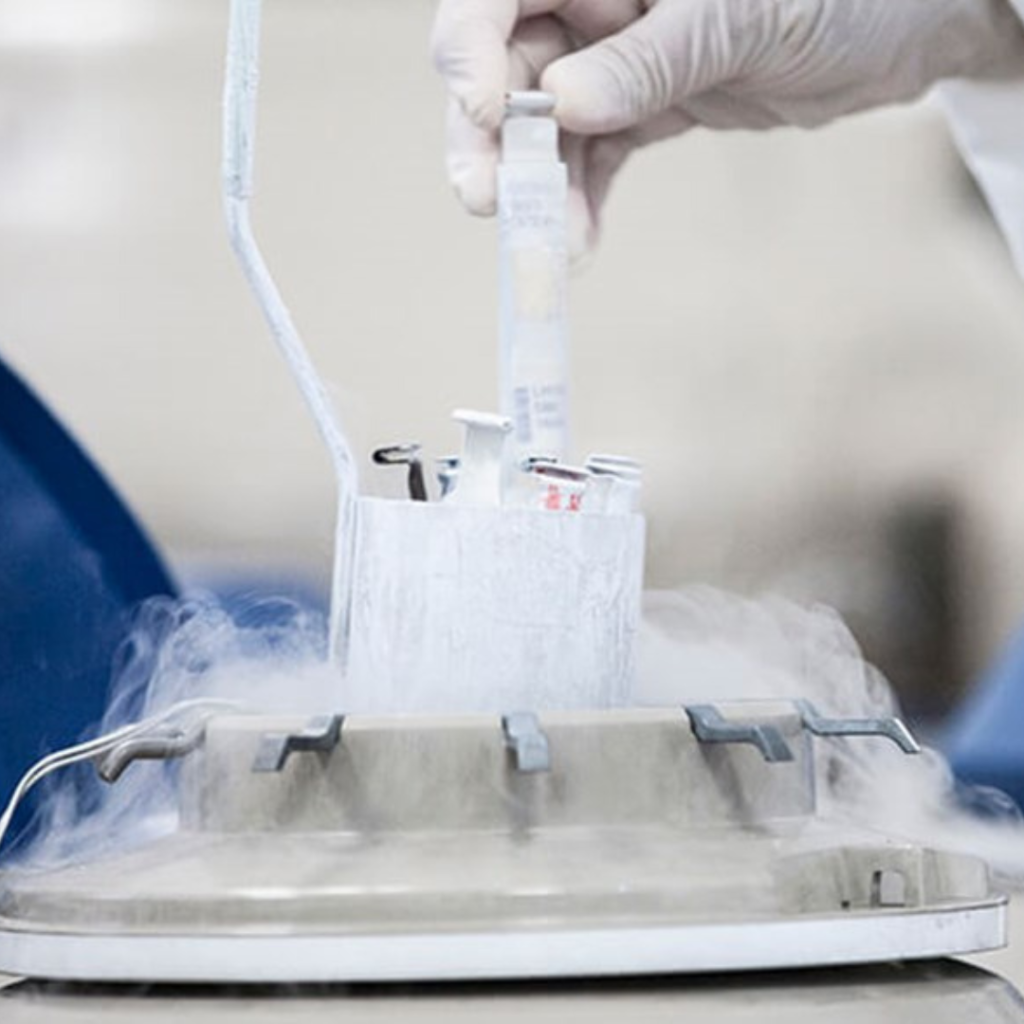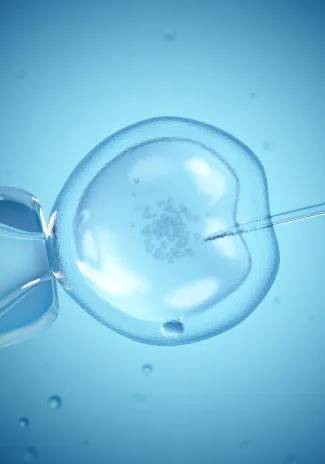Egg Freezing
In Singapore, egg freezing for medical reasons is allowed. From July 2023, elective egg freezing is also allowed for women aged 21 – 37, regardless of marital status.

What is Egg Freezing?
Egg freezing, also known as oocyte cryopreservation, is a medical procedure that involves the extraction, freezing, and storage of a woman’s eggs (oocytes) for future use. It is a method of fertility preservation that allows women to preserve their eggs when they are at their peak fertility, typically in their 20s or early 30s, for use in the future when they are ready to conceive.
Egg freezing provides women with the option to preserve their fertility for various reasons, such as medical conditions that may affect fertility, career or educational pursuits, or personal choices. It offers the possibility of having biological children later in life when the woman may face an age-related decline in fertility.
What is egg freezing process?
The egg freezing process, also known as oocyte cryopreservation, involves several steps. Here is a general overview of the process:
Ovarian Stimulation:
Once you decide to proceed with egg freezing, you will begin the process of ovarian stimulation. This involves taking hormonal medications, typically in the form of daily injections, to stimulate the ovaries to produce multiple eggs. The medications help to promote the growth and maturation of multiple follicles, which contain the eggs
Monitoring:
Throughout the ovarian stimulation phase, you will have regular monitoring appointments. These appointments involve transvaginal ultrasound scans and blood tests to monitor the development of the follicles and hormone levels. The doctor will adjust the medication dosage if necessary to optimize the number and maturity of the eggs.
Egg Retrieval:
When the follicles have reached the desired size and the eggs are mature, the egg retrieval procedure is scheduled. It is a minor surgical procedure performed under sedation or anesthesia. Using transvaginal ultrasound guidance, a thin needle is inserted into each follicle to retrieve the eggs. The procedure usually takes about 20-30 minutes.



Egg Freezing:
mmediately after retrieval, the eggs are evaluated for their quality and maturity. The mature eggs are then cryopreserved (frozen) using a process called vitrification. Vitrification involves rapidly cooling the eggs to very low temperatures to prevent ice crystal formation, which could damage the eggs. The frozen eggs are stored in a specialized laboratory facility.
Storage:
The frozen eggs can be stored for an extended period, typically several years, in a cryogenic storage facility. The storage conditions ensure the long-term preservation of the eggs’ viability.
Thawing and Fertilization:
When you are ready to use the frozen eggs, they are thawed in a controlled manner. Thawing is done by warming the eggs and removing the cryoprotectant solutions. Once thawed, the eggs are fertilized with sperm through a process called in vitro fertilization (IVF). This can be done using either fresh or frozen sperm.
Embryo Transfer:
After fertilization, the resulting embryos are cultured in the laboratory for a few days. The best-quality embryos are selected for transfer to the uterus. The embryo transfer procedure is similar to a standard IVF procedure, where a thin catheter is used to place the embryos into the uterus. If the embryo successfully implants, pregnancy can occur.
Who should consider elective egg freezing?
FAQs elective egg freezing in Singapore
The optimal age for elective egg freezing in Singapore can vary depending on individual circumstances and goals. However, many experts recommend that women consider freezing their eggs before the age of 35 for the best chance of success. This is because a woman’s fertility declines significantly after this age, making it more difficult to retrieve high-quality eggs for freezing. Additionally, younger eggs are generally healthier and have a higher chance of resulting in a successful pregnancy when they are eventually used for fertility treatment. Ultimately, the decision of when to freeze one’s eggs should be made in consultation with a fertility specialist based on individual factors such as age, health, and reproductive goals.
The success rate for elective egg freezing for live birth can vary depending on a variety of factors, including the age of the woman at the time of egg retrieval, the quality of the eggs retrieved, and the expertise of the fertility clinic performing the procedure. Generally speaking, younger women tend to have higher success rates with elective egg freezing, as their eggs are typically of better quality. According to some studies, women who freeze their eggs before the age of 35 have a higher chance of achieving a successful live birth when they decide to use those eggs in the future. However, it’s important to keep in mind that there are no guarantees when it comes to fertility treatments, and success rates can vary from person to person. It’s always best to consult with a fertility specialist to get personalized information about your chances of success with elective egg freezing.
The risks associated are low, though there can be side effects from fertility medications like bloating or mild discomfort, or rare instances of ovarian hyperstimulation syndrome (OHSS). There’s a minimal risk of infection, bleeding, or organ damage during the egg retrieval procedure, but these complications are rare.
Eggs can be stored for many years, with some fertility clinics offering storage options for up to 10 years or even longer. The length of time embryos can be stored depends on various factors, including the regulations of the country or state where the clinic is located, as well as the individual circumstances of the patients involved. Some people may choose to store their embryos for an extended period of time if they are not ready to use them or if they are considering future fertility treatments. It is important to discuss storage options and limitations with a fertility specialist to determine the best course of action for each situation.
The number of embryos that can be frozen in one cycle may vary depending on a variety of factors, including the individual’s age, ovarian reserve, and response to fertility medications. It is important to consult with a fertility specialist to determine the best course of action for your specific situation. Additionally, the success rates of freezing embryos can also vary, so it is important to discuss all options and potential outcomes with your healthcare provider.
There is no guarantee that frozen eggs will result in a successful pregnancy in the future. While advancements in egg freezing technology have greatly improved success rates, there are still many factors that can impact the outcome of using frozen eggs for fertility treatment. These factors include the quality of the eggs, the age of the woman at the time of egg retrieval, and any underlying fertility issues that may be present. It is important for individuals considering egg freezing to discuss their options with a fertility specialist and understand the potential risks and limitations involved.
Yes, frozen eggs are available for pregnancy whenever you’re prepared. Upon your decision, the eggs are thawed, fertilized with sperm using in vitro fertilization (IVF), and the resulting embryos are placed in the uterus for pregnancy.
The procedure doesn’t appear to impact future fertility or long-term health. Yet, the efficacy of using frozen eggs for pregnancy relies on several factors, including the woman’s age and health during egg retrieval.
The egg freezing procedure is generally not painful, being performed under sedation or anaesthesia. The ovarian stimulation phase might lead to mild discomfort like bloating and breast tenderness. After egg retrieval, short-lived discomfort akin to menstrual cramps might occur, manageable with pain medication.
Who could be unsuitable for undergoing egg freezing?ight not be suitable for women of advanced reproductive age, particularly in their late 30s or 40s, due to potential reduced egg quality and quantity affecting success. Diminished ovarian reserve, characterized by low egg number or quality, could also limit success. Medical conditions like ovarian-impacting cancers, certain genetic disorders, and severe reproductive abnormalities might render egg freezing unsuitable. Conditions affecting ovaries or pelvic region, like severe endometriosis or large cysts, could hinder egg retrieval and successful freezing chances.
The cost of egg freezing in Singapore can vary depending on the clinic and the specific services included in the package. On average, the cost of one cycle of egg freezing in Singapore can range from $8,000 to $15,000. This cost typically includes consultations, ultrasound monitoring, egg retrieval procedure, anesthesia, laboratory fees for freezing and storage of eggs, and medications. Additional costs may also include pre-screening tests, genetic testing, and storage fees for the frozen eggs.
find out more about egg freezing?
It’s important to consult with a fertility specialist to discuss individual circumstances, success rates, potential risks, and any specific concerns regarding elective egg freezing.

